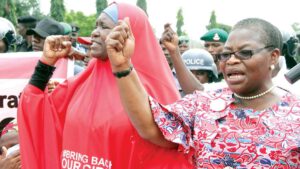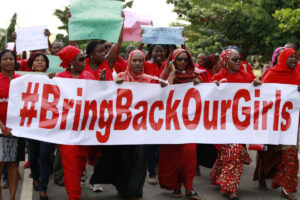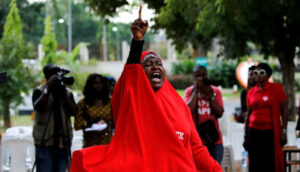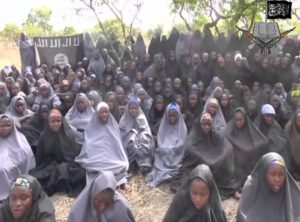By Gabriel Atumeyi
Sometime in 2014, global outrage was sparked by the kidnap, in one fell swoop, of 276 girls from Government Girls Secondary School, Chibok, Borno State, by the Islamic terrorist group, Boko Haram. In the aftermath of the incident, a movement dedicated to demand for their safe return, the Bring Back Our Girls (BBOG) Movement, was born.
The group, jointly spearheaded by former federal minister and World Bank executive, Oby Ezekwesili and human rights activist, Aisha Yesufu, was vibrant in its advocacy for the girls to be rescued and reunited with their families.

*Oby Ezekwesili and Aisha Yesufu leading one of BBOG marches
In spite of the ferocity of their advocacy under the President Goodluck Jonathan administration – and sustenance of same under the Muhammadu Buhari government which succeeded it – it would seem as though the group has become moribund, without all of the girls back home.
Advocacy group or opposition tool?
The Bring Back Our Girls movement was resounding in its demand for justice for the abducted Chibok School girls, as the group rallied the public to put pressure on the government to expedite actions and ensure the rescue and safe return of the girls. In the process, the group, consciously or unconsciously, became perceived as a major anchor of the opposition against the Jonathan administration. In fact, it was to be later considered by some Nigerians, and other observers, as one of the factors that led to President Jonathan’s failure to get re-elected in 2015 for a second term.
In its early days, BBOG was a broad coalition involving international rights groups such as Amnesty International, UNICEF, as well as world leaders and celebrities, including former America Secretary of State, Hilary Clinton, child rights activist, Malala Yousafzai and rappers Wyclef Jean and Chris Brown, and witnessed protests and demonstrations from India to New York. There was even a global “social media” march in which supporters used their networks to promote the campaign for 200 minutes on May 8, 2014, with the hashtag, #BringBackOurGirls becoming one of the most popular on Twitter with over 4 million mentions.
At its height, the movement was a thorn in the side of the administration, as both the Jonathan government and the succeeding government of Muhammadu Buhari went as far as imposing bans and restrictions on public protest, particularly in Abuja where they threatened to disrupt government businesses on several occasions by besieging the Presidential Villa and the National Assembly.

*File photo of a protest march by BBOG group
With their flaming red shirts, red and white banners and placards, they held daily sit-ins at the Unity Fountain in the heart of Abuja, and occasionally undertook protest marches through the city’s nerve centres with rhythmic chants of “bring back our girls,” “When shall we stop?” “Not until our girls are back and alive.”
Diminished passion
While no one can, in good conscience, refer to the group as a flash in the pan, time seems to have, however, whittled down the movement’s enthusiasm, as well as hope for the return of the abducted students.
Six years on, the passion that drove the #Bringbackourgirls has been largely extinguished, as it neither trends nor is the media actively interested in the agitation.
Indeed, all that is left of the once vibrant and broad movement is a handful of weary supporters who gather, after long spells, at the usual spot about three years since they last heard good news of a safe return from among the girls.
Pushing against all odds
However, Jeff Okoroafor, spokesman of the group, told 365Daily that despite the national amnesia and decreasing numbers at the group’s rallies, it is not fatigued in its advocacy for the safe return of the girls.

*Okoroafor
Okoroafor said, “Our challenge is having our girls back in our lives, and what that means is that we are not going to give up, we will continue to demand until our girls are back. It is over six years that they were abducted and we have been demanding, and we will continue to stand for them. We continued to meet at the Unity Fountain until the COVID-19 lockdown came.
“I am sure if you had looked around you would have seen the statement that we released during the period, where we said we are going to suspend our daily sit-out because of the COVID-19 situation until it is dealt with. So that is why we are not meeting regularly for now, but we will continue to use other means to put out statement from time to time via our website; we will continue to engage the government in various ways that we can.
“Just that other activities are also coming up. We are taking in all of these but we have not given up. About 112 of our girls, including Leah Sharibu, are out there. So we haven’t packed up. We are still there, and we are still demanding for their rescue.
“Yes, there are a lot of other issues coming out that the people are engaged, and when an advocacy such as this runs for a long time, the possibility of people getting tired is there but even if it is one person standing and speaking out on behalf of this girls, they have a representation and that is what we are doing and we will continue to do. We are also engaging the international community so that they can also from that angle put pressure on the government not to sweep the issue under the carpet,” he added.
Also speaking to 365Daily, Aisha Yesufu, one of the co-founders of the group, affirmed that the movement is still alive and has a mandate that stands until the remaining girls are returned or accounted for, even if dead.

*Yesufu
She said, “The bring back our girls movement is still on, the important thing we should be asking government is what are they doing to rescue our Chibok girls. Government isn’t doing anything and that is where the main issue is. It seems they want to forget it. Nigerians are not making demands. The journalists are not asking the president anything about the Chibok girls. So that is the main case, but the movement is still on. We are still making our advocacy the way we have always done.
“Also, I think one of the things Nigerians need to know is that there is no movement that is BBOG. Everyone of us should be and the reason why we refuse to stop making demand for Chibok girls… today, see what is happening in our country, abductions are going on, kidnappings are going on, killings going on, why? Because when it happened to other people, we all looked away.
“112 Chibok girls are actually still missing and are not yet back home. And of course, there is hope because even before we got the 107 that came back, we were asked the same question. Do you think there is still any hope? What are you people doing?

*Abducted Chibok girls in a photo released by Boko Haram
“What we are saying is that the government should account for each and everyone of them, even if they are dead. It is the duty of government to account for them,” she added.
With the restrictions occasioned by the COVID-19 outbreak on public gatherings gradually being eased off, it is left to be seen if the group can once again galvanise its supporters to ensure that the remaining Chibok girls still in captivity are brought back home.